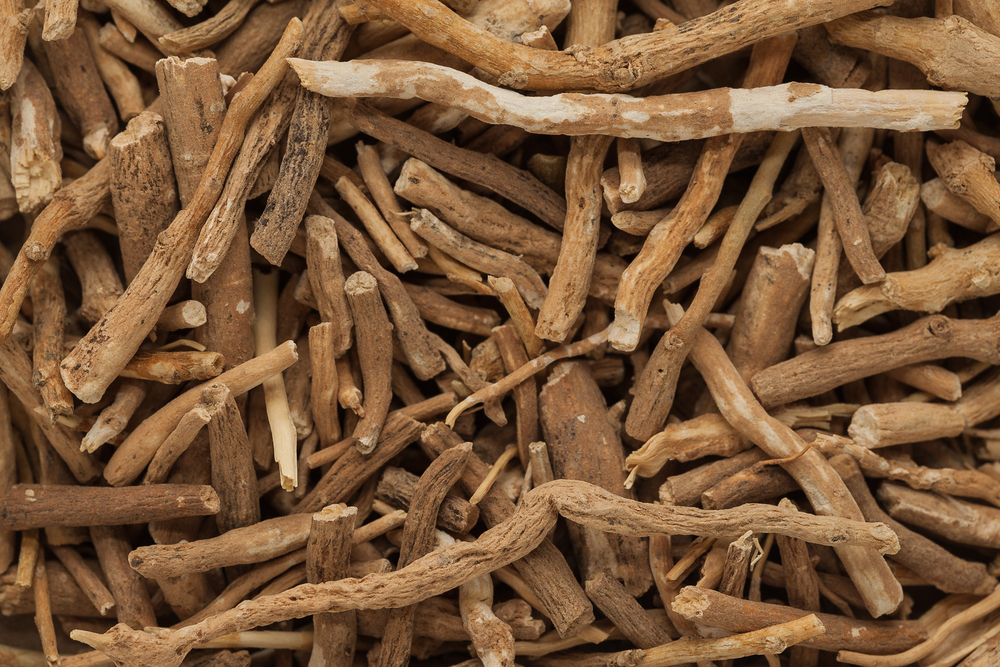
Ashwagandha (Withania somnifera) derives its name from Sanskrit “Ashwa” meaning horse and “Gandha” meaning smell referring to the fresh root’s distinct aroma, said to be reminiscent of a horse, and symbolically to its traditional belief in imparting the strength and vitality of a stallion.
It is one of Ayurveda’s most valued rasayana (rejuvenative) herbs. Classical texts describe it as balya (strength-promoting), medhya (supporting intellect) and rasayana (promoting longevity and vitality). Traditionally, it is used to pacify vāta (and to some extent kapha), nourish the nervous system and support resilience to stress.
In Ayurvedic pharmacology, Ashwagandha is characterized by tikta/kashāya rasa (bitter/astringent taste), laghu/snigdha guṇa (light/unctuous qualities), uṣṇa vīrya (heating potency) and madhura vipāka (sweet post-digestive effect), aligning with its restorative and grounding profile.
The root is the most commonly used part and is formally monographed in the Ayurvedic Pharmacopoeia of India. In recent years, Ashwagandha has also gained global recognition for its ability to improve sleep quality, helping people fall asleep faster, achieve deeper rest, and experience more refreshing sleep.
Key Phytochemistry and Proposed Mechanisms
Ashwagandha contains steroidal lactones (withanolides and withaferin A), alkaloids and sitoindosides. Modern hypotheses for its effects include modulation of the hypothalamic–pituitary–adrenal (HPA) axis, support for GABAergic signaling (contributing to anxiolytic and sleep benefits) and anti-inflammatory/antioxidant actions that may underlie cognitive and physical-performance outcomes.
Ashwagandha is one of the few herbs that can naturally help improve sleep quality without causing dependency.
Ayurveda explains this through its medhya rasayana property, calming the nervous system and nourishing the mind. Modern science links these effects to its ability to reduce stress hormones and support GABA activity in the brain.
Known as a natural adaptogen, Ashwagandha helps the body adapt to stress, whether it’s mental, emotional, or physical.
Ayurveda considers it both balya (strength-promoting) and manas shamak (mind-soothing), making it ideal for today’s fast-paced lifestyles.
Ashwagandha is valued for enhancing brain function.
Ayurveda recommends it for students, professionals and older adults as a medhya herb, one that nourishes the mind and promotes intellect.
Athletes and fitness enthusiasts often use Ashwagandha to support performance.
Its balya (strength-giving) and br̥mhana (nourishing) qualities make it an ideal herb for people recovering from illness or weakness.
Ashwagandha may help maintain healthy thyroid function, particularly in people with low thyroid activity.
Ayurveda links thyroid balance to overall energy (ojas) and metabolic fire (agni), both of which Ashwagandha is believed to strengthen.
From an Ayurvedic lens, Ashwagandha is a classic rasayana that builds resilience, steadies the nervous system, and supports strength and longevity. Modern clinical trials increasingly echo this tradition, showing benefits for stress and cortisol, sleep, cognition and training adaptations, with a generally favorable safety profile when using quality, standardized root extracts. While evidence quality ranges from preliminary to moderate depending on the endpoint, the overall picture supports Ashwagandha as a practical, science-supported adaptogen when used thoughtfully and individualized to the person, condition and context.
Disclaimer: This blog is for educational purposes only and not a substitute for professional medical advice.